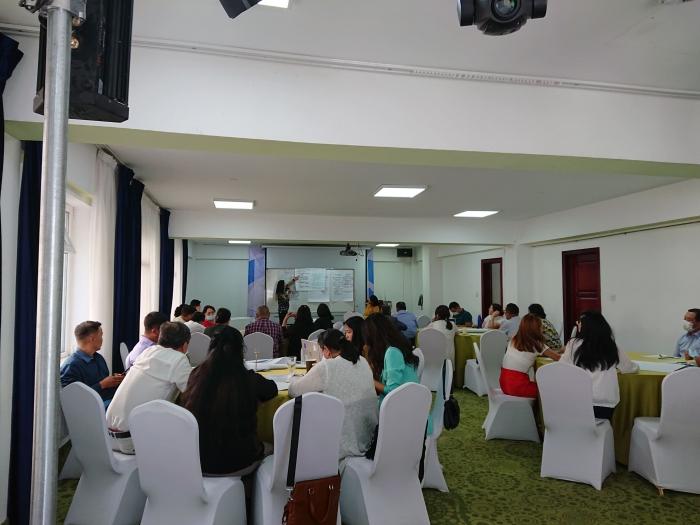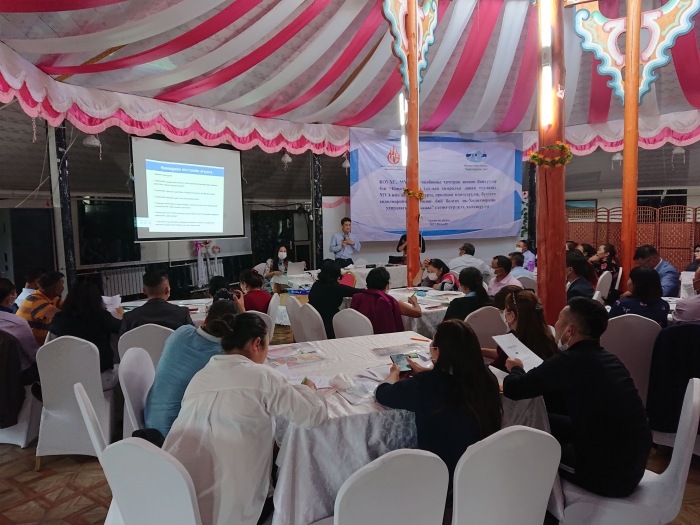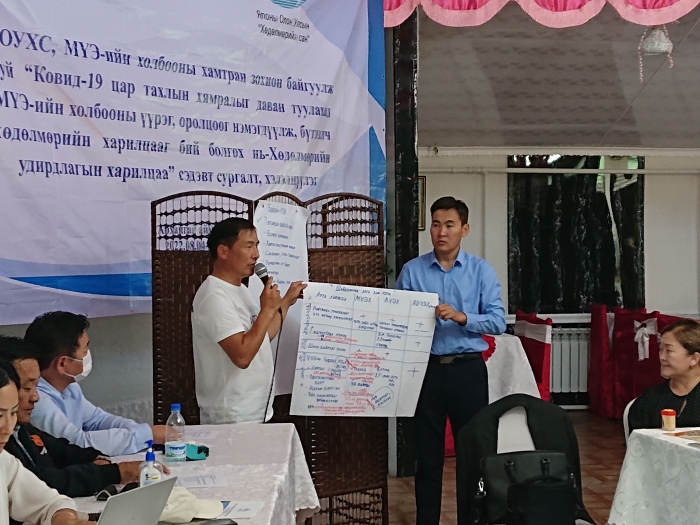CMTU/JILAF Seminars on Industrial Relations and Labour Policy for Mongolia
From August 1-2 and August 4-5, JILAF, together with the Confederation of Mongolian Trade Unions (CMTU), held seminars on industrial relations and labour policy in the Mongolian cities of Ulaanbaatar and Tsetserleg in Arkhangai Province. The seminars were attended by a total of 130 people, including representatives of each prefectural organization and leaders of each member organization.
At the beginning of the seminars, CMTU President Erdenebat, JILAF Executive Director Motobayashi, and First Secretary Ichioka of the Embassy of Japan in Mongolia gave opening addresses, and explained the purpose and objectives of the seminars to all participants.
Following this, in a lecture titled “The Role of Trade Unions in a Fair Recovery of the Economy and Labour Market,” President Erdenebat emphasized that employment and labour-related issues are not recognized as priority issues in Mongolia, and that in order to further demonstrate the role of trade unions, it is necessary to work on the pillars that underlie trade union activities, such as (1) actualizing decent work, (2) improving health and safety in the workplace and the health of workers, (3) organizing workers, (4) improving human resource development and industrial relations, and (5) maximizing the use of CMTU resources.
In addition, President Erdenebat shared that the key features of the revised labour law are the expansion of its scope to include informal sector workers such as nomads, as well as the clear indication of the prohibition on violence and harassment, and the methods for resolving industrial disputes. He also explained that the roles and responsibilities of trade unions have become far greater than ever before.
Next, from JILAF’s side, Executive Director Motobayashi gave a lecture on the topics of (1) industrial relations and stable employment in Japan, and (2) the role and challenges of Japan’s trade unions in the COVID-19 pandemic. When speaking about (1), Motobayashi gave a general explanation of the key features of the labour movement and industrial relations in Japan, which comprise of the history of Japan’s labour movement, the functions and roles of Japan’s trade unions (the spring labour offensive, the productivity movement, labour-management consultations, etc.), and Japan’s tripartite strategy system. Afterwards, he also explained how Japan’s trade unions and government are responding to minimize the impact of COVID-19 on employment.
On the second day of the seminars, President Ganbaatar of the Mongolian Employers’ Federation (MONEF) “promoted social dialogue for building good industrial relations” by proclaiming, “The revised labour law has made the role of tripartite consultations between government, labour and management even more important. In the past, there were many occasions where conflicts would arise in tripartite consultations, but now the relations between the three parties are deemed to have matured to a point where they can be stipulated in law. This is a tremendous development. For management, the environment now is harsher than ever before, and if it continues to stay this way, more and more small and medium-sized enterprises will go bankrupt. Those in management will do their best to secure their workplace, but in order to do so, it is necessary to create a system in which labour and management can sit together at the same table to have constructive discussions, and grow together.”
Next, at the seminar in Ulaanbaatar, reports were received from organizations in each industry, and at the seminar in Arkhangai Province, reports were received from representatives of five neighboring provinces about the activities and challenges of each organization. While each industry reported on their efforts to maintain employment, they also expressed their acknowledgement of the challenge in figuring out how to raise wages in response to the inflation (2020: 2.3%, 2021: 13.4%, 2022: 16.2% *From CMTU materials) caused by China’s border closure and the crisis in Ukraine. In addition, reports from each prefecture included a wide range of topics, including human resource development, improvement of finances, workplace health and safety, and organization. Notably, with regards to the topic of organization, examples of organizing informal sector workers such as retail store owners and nomads, and promoting their admission into the social insurance system were shared.
At the closing ceremonies for the seminars, the representative of CMTU, General Secretary Buyanjargal, thanked JILAF and the Government of Japan for their cooperation, and expressed, “I would like for each organization here to consider and implement concrete measures for recovery by skillfully linking CMTU’s basic policy with the good practices of Japan and each organization.”
Then from JILAF, Executive Director Motobayashi ended the seminars by stating, “I can feel that everyone is working hard to build constructive industrial relations and government-labour-management relations. While there may be many challenges, I hope that you will continue to work on your own activities with confidence. I also hope that we will continue to work with CMTU in the future.”



